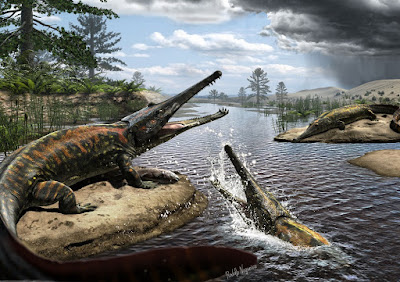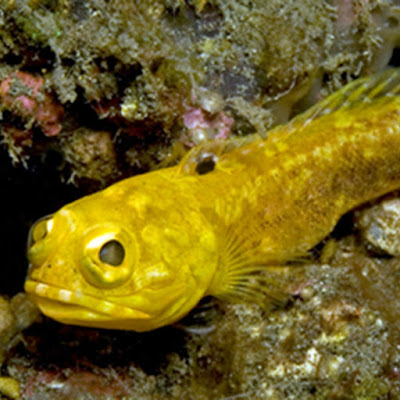[Most Recent Entries] [Calendar View]
Wednesday, November 23rd, 2016
| Time | Event | ||||
| 4:30a | [Paleontology • 2015] The Cranial Morphology of the Temnospondyl Australerpeton cosgriffi (Tetrapoda: Stereospondyli) from the Middle–Late Permian of Paraná Basin and the Phylogenetic Relationships of Rhinesuchidae
Abstract Stereospondyls are a diverse and morphologically distinctive clade of basal tetrapods that rapidly reached a global distribution and high abundance during the Early Triassic. Yet, the first stereospondyls appeared in the Middle–Late Permian of Gondwana, mostly represented by Rhinesuchidae. Australerpeton cosgriffi is a long-snouted representative of the group and one of the most complete temnospondyls known from the Permian of South America. The elements attributed to Au. cosgriffi were recovered from the Middle-Late Permian deposits of the Rio do Rasto Formation (Paraná Basin), in the Serra do Cadeado area of Brazil. Here, we review the cranial anatomy of the species, providing a comparative redescription, new anatomical data and previously unrecognized characters. Australerpeton cosgriffi is nested within Rhinesuchidae based on the anatomy of the tympanic cavity, but its long-snouted condition is unique amongst rhinesuchids. Based on the recovered information and new morphological data, the systematic position of Au. cosgriffi was assessed using a new matrix of 221 characters; of which 196 were selected from previous studies and the remaining are newly proposed. The results show Rhinesuchidae divided into Rhinesuchinae and Australerpetinae. A unique tympanic cavity formed by a well posteroventrally projected tabular horn, stapedial groove, well-developed oblique crest on the pterygoid, and a dorsal pterygoid crest (new term) characterizes the ear region of Rhinesuchidae. Australerpeton cosgriffi is the only undisputed Rhinesuchidae record outside southern Africa and the first long-snouted Stereospondyli, and thus is useful in helping to understand the diversification of the stereospondyls during the Middle/Late Permian of Gondwana. Keywords: Gondwana; long-snouted rhinesuchid; Palaeozoic; phylogenetics; Rio do Rasto Formation; systematics; Temnospondyli; tympanic cavity Estevan Eltink, Eliseu V. Dias, Sérgio Dias-da-Silva, Cesar L. Schultz and Max C. Langer. 2015. The Cranial Morphology of the Temnospondyl Australerpeton cosgriffi (Tetrapoda: Stereospondyli) from the Middle–Late Permian of Paraná Basin and the Phylogenetic Relationships of Rhinesuchidae. Zoological Journal of the Linnean Society. 176(4); 835–860. DOI: 10.1111/zoj.12339 Paleontologists describe giant amphibian that lived 260 million years ago http://agencia.fapesp.br/paleontologists | ||||
| 11:01a | [Ichthyology • 2016] Opistognathus ensiferus • A New Species of Jawfish (Opistognathidae) from the Gulf of Mannar, India, with Redescription of O. solorensis
Abstract A new species of jawfish, Opistognathus ensiferus n. sp., is described based on a single specimen from Manauli Reef in the Gulf of Mannar, India. It is a member of a species group that also includes Opistognathus solorensis Bleeker (Indonesia, Philippines, Taiwan and Palau) and O. verecundus Smith-Vaniz (northwestern Australia). From these two species O. ensiferus n. sp. differs in lacking dark oral pigmentation, except inner lining of upper jaw and adjacent membranes with a single dark stripe (vs. two stripes) and in having a lateral line ending below the 6th or 7th segmented dorsal-fin ray (vs. below the 1st to 4th ray). Opistognathus solorensis is redescribed and in the absence of extant type specimens a neotype is designated. Two strikingly different color morphs are documented for O. solorensis, including the less common one which is almost entirely yellow. Keywords: Pisces, Opistognathidae, jawfish, Opistognathus ensiferus new species, India
W.F. Smith-Vaniz. 2016. Opistognathus ensiferus, A New Species of Jawfish (Opistognathidae) from the Gulf of Mannar, India, with Redescription of O. solorensis Bleeker. Zootaxa. 4196(2); 278-288. DOI: 10.11646/zootaxa.4196.2.6 |
| << Previous Day |
2016/11/23 [Calendar] |
Next Day >> |


